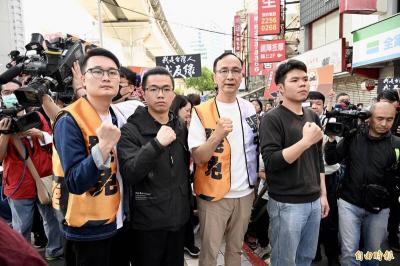An online petition protesting against the government’s rush to implement the cross-strait service trade agreement is picking up steam, with support from academics and leading figures from the arts and cultural sector.
The petition was launched on Tuesday by 18 artists, academics and representatives from the publishing and media sectors who issued a joint statement calling on the government to reopen negotiations on the pact signed in June. As of yesterday afternoon it had attracted more than 12,000 signatures and endorsements from 63 organizations.
The statement also demands the Legislative Yuan hold individual public hearings on every service sub-sector covered by the pact and postpone a review of, or voting on, the agreement until the government has released reports evaluating its impact on Taiwan’s society, national security and service industry.
The government should recommence negotiations with China on the basis of the results of the legislature’s item-by-item review, the statement said.
In a blog posting, award-winning screenwriter and author Neil Peng (馮光遠), one of the campaign initiators, urged more people to sign up.
“If Taiwan is to follow the script as penned by [President] Ma Ying-jeou (馬英九) and [close Ma aide and representative to the US] King Pu-tsung (金溥聰), then Taiwan’s democracy and its accomplishments will be burned up and turned into ashes. If that happens, people should not complain or feel disappointed [if they do not take action],” Peng wrote.
Liang Wen-tao (梁文韜), a political science professor at National Cheng Kung University, posted a message on his Facebook page promoting the cause.
“Do not miss out on this campaign, we call on everyone to join in,” he wrote.
Several National Taiwan University professors are among the petition’s initiators.
They include Shieh Ming-yan (謝銘洋), dean of the Faculty of Law, Chen Juo-shui (陳弱水), dean of the College of Liberal Arts, Hung Chen-ling (洪貞玲), head of the Graduate Institute of Journalism and Chang Chin-hwa (張錦華), a journalism professor.
A number of distinguished researchers at Academia Sinica have also signed the petition, including Liaw Yun-fan (廖運範), Cheng Tai-ann (鄭泰安), Lin Jih-wen (林繼文), Wu Jui-jen (吳叡人) and Su Yen-tu (蘇彥圖).
Chen Hsiao-yi (陳曉宜), chairwoman of the Association of Taiwan Journalists, said many academics and prominent business leaders, such as Locus Publishing Co chairman Rex How (郝明義), have spoken out against the agreement.
“Yet Ma and his government officials remain indifferent to these voices and have even tried to vilify them. We have received more than 10,000 signatures in just a few days. This shows people are fed up with the government’s stance,” she said.
Additional reporting by CNA

The Ministry of Economic Affairs has fined Taobao NT$1.2 million (US$36,900) for advertisements that exceeded its approved business scope and ordered the Chinese e-commerce platform to make corrections in the first half of this year or its license would be revoked. Lawmakers have called for stricter supervision of Chinese e-commerce platforms and more stringent measures to prevent China from laundering its goods through Taiwan as US President Donald Trump’s administration cracks down on origin laundering. The legislature’s Finance Committee yesterday met to discuss policies to prevent China from dumping goods in Taiwan, inviting government agencies to report on the matter. Democratic Progressive Party

Taiwan and its Pacific ally Tuvalu on Tuesday signed two accords aimed at facilitating bilateral cooperation on labor affairs, according to Taiwan’s Ministry of Foreign Affairs (MOFA). The governments inked two agreements in Taipei, witnessed by Foreign Minister Lin Chia-lung (林佳龍) and visiting Deputy Tuvaluan Prime Minister Panapasi Nelesone, MOFA said in a news release. According to MOFA, the agreements will facilitate cooperation on labor issues and allow the two sides to mutually recognize seafarers’ certificates and related training. Taiwan would also continue to collaborate with Tuvalu across various fields to promote economic prosperity as well as the well-being of their

Taiwan would welcome the return of Honduras as a diplomatic ally if its next president decides to make such a move, Minister of Foreign Affairs Lin Chia-lung (林佳龍) said yesterday. “Of course, we would welcome Honduras if they want to restore diplomatic ties with Taiwan after their elections,” Lin said at a meeting of the legislature’s Foreign Affairs and National Defense Committee, when asked to comment on statements made by two of the three Honduran presidential candidates during the presidential campaign in the Central American country. Taiwan is paying close attention to the region as a whole in the wake of a

The Taipei District Prosecutors’ Office has continued its investigation into allegations of forged signatures in recall efforts today by searching the Chinese Nationalist Party’s (KMT) city chapter and questioning several personnel including the chapter director, according to media reports. Among those questioned and detained were KMT Taipei chapter director Huang Lu Chin-ju (黃呂錦茹), chapter secretary-general Chu Wen-ching (初文卿), chapter secretary Yao Fu-wen (姚富文) and first district committee executive director Tseng Fan-chuan (曾繁川). Prosecutors said they would not confirm reports about who had been summoned. The investigation centers on allegations that the ongoing recall campaigns targeting Democratic Progressive Party legislators Rosalia Wu (吳思瑤)